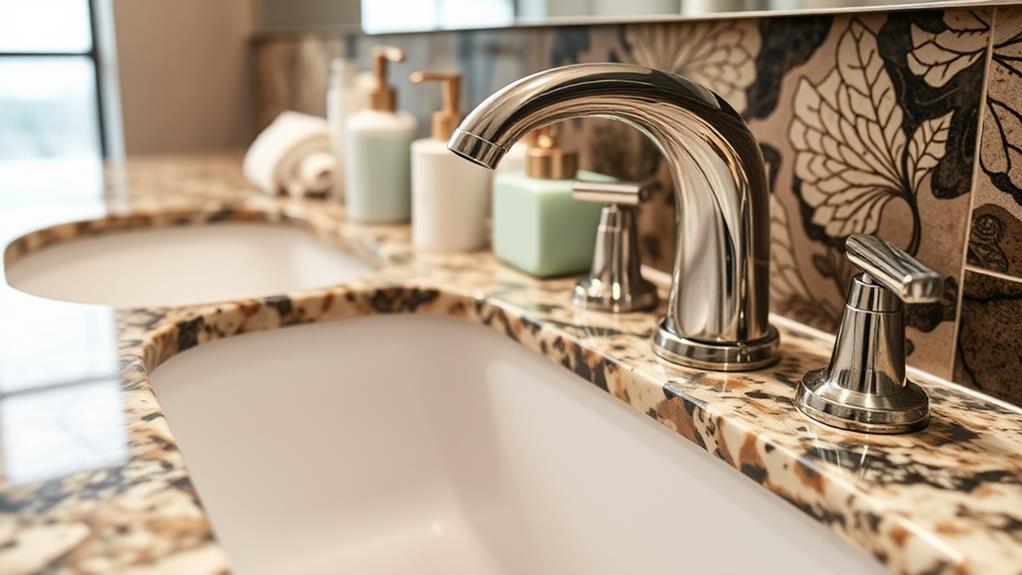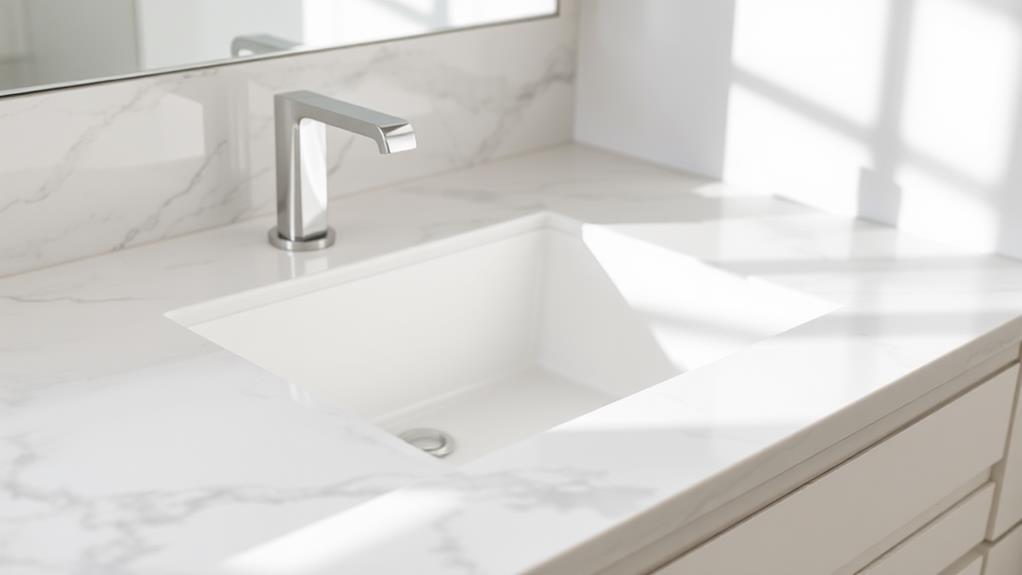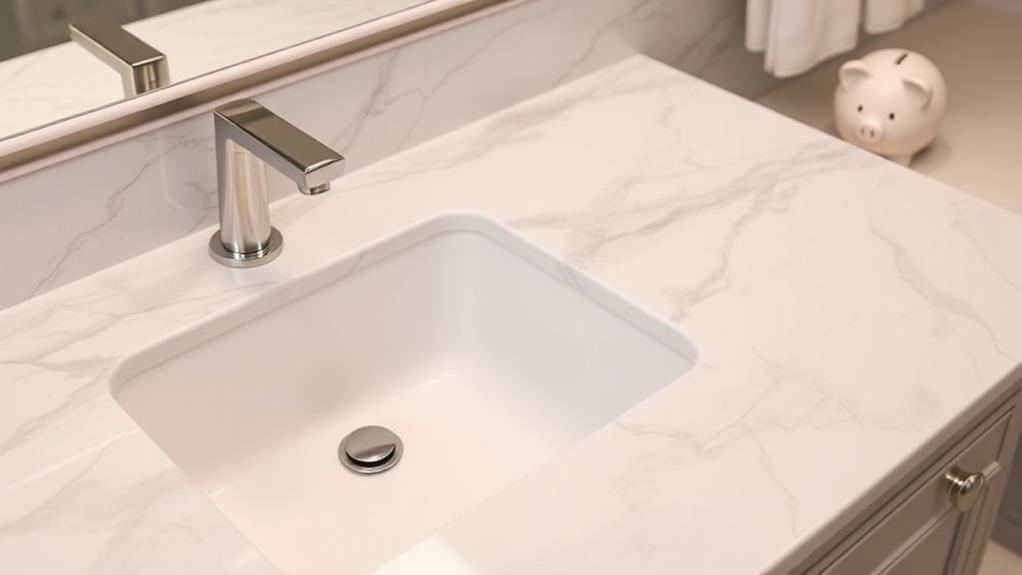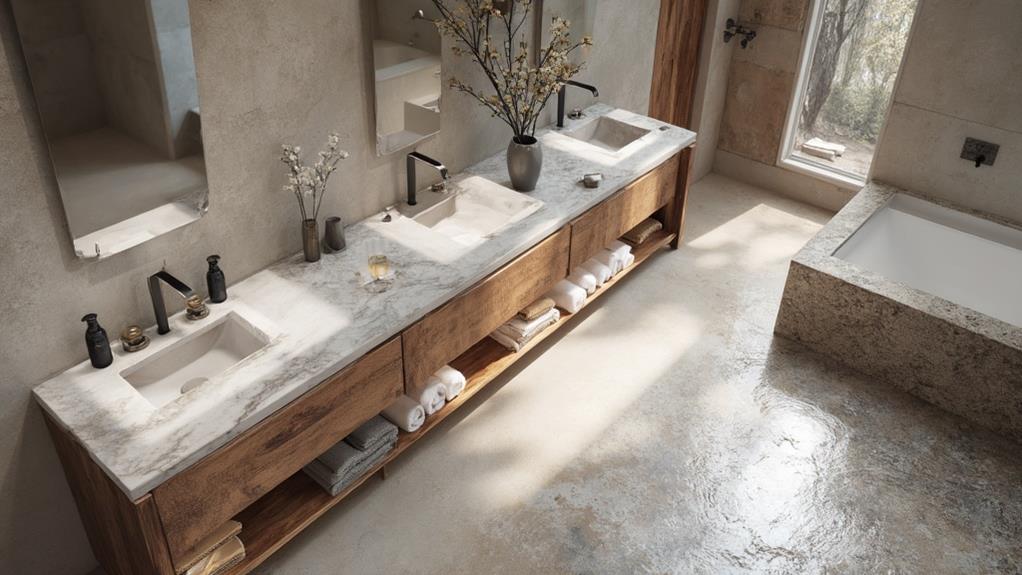When choosing a bathroom countertop, you'll need to weigh durability, maintenance, and aesthetics against your budget. Granite offers elegance and durability but requires sealing. Quartz is low-maintenance and stain-resistant but can be pricey. Marble provides timeless beauty but demands extra care. Solid surfaces are seamless and easy to clean yet prone to scratches. Laminate is budget-friendly but less durable. Concrete allows for customization but needs regular sealing. Each material has its unique pros and cons, so consider your lifestyle and preferences carefully. By exploring these options further, you'll discover which countertop best suits your bathroom needs.
Granite Countertops

Granite countertops stand out as a popular choice for bathrooms, offering a perfect blend of durability and elegance. They're resistant to scratches, heat, and stains, making them ideal for high-traffic areas. You'll find a wide range of colors and patterns, allowing you to match your bathroom's aesthetics easily.
However, granite isn't without its drawbacks. It's a porous material, requiring regular sealing to prevent moisture absorption and staining. This maintenance can be time-consuming and adds to the overall cost. Speaking of cost, granite is one of the more expensive options for bathroom countertops.
Installation can be tricky due to granite's weight, often requiring professional help. It's also prone to chipping if heavy objects are dropped on the edges. While granite is generally resistant to bacteria, its porous nature can harbor germs if not properly sealed and maintained.
Despite these cons, many homeowners find granite's pros outweigh its disadvantages. Its longevity and timeless appeal can increase your home's value. If you're willing to invest in regular maintenance and can afford the initial cost, granite countertops can be an excellent choice for your bathroom.
Quartz Surfaces
A rising star in the world of bathroom countertops, quartz surfaces offer a compelling alternative to natural stone options. These engineered surfaces combine ground quartz with resins and pigments, creating a durable and low-maintenance material.
You'll appreciate quartz's non-porous nature, which makes it highly resistant to stains and bacteria growth. It's also scratch-resistant and doesn't require sealing, unlike natural stone. Quartz comes in a wide range of colors and patterns, allowing you to achieve the look you want without the variability of natural stone.
However, quartz isn't without drawbacks. It's typically more expensive than some natural stone options and can be susceptible to heat damage. While it mimics the look of natural stone, some homeowners find it lacks the unique character and depth of genuine marble or granite.
Installation of quartz countertops requires professional expertise, as the material is heavy and can crack if not properly supported. Despite these considerations, quartz remains an excellent choice for bathroom countertops, offering a balance of durability, aesthetics, and ease of maintenance that many homeowners find appealing.
Marble Elegance

Marble's timeless beauty has made it a favorite choice for bathroom countertops. Its natural veining and unique patterns create an elegant, luxurious atmosphere that's hard to replicate. You'll find marble in a variety of colors, from classic white to dramatic black, allowing you to match your bathroom's aesthetic perfectly.
However, marble comes with some drawbacks. It's a softer stone than granite or quartz, making it more susceptible to scratches and chips. You'll need to be careful with heavy objects and acidic substances, as they can damage the surface. Marble is also porous, requiring regular sealing to prevent stains and etching.
Despite these challenges, many homeowners find marble's beauty worth the extra maintenance. To keep your marble countertop looking its best, you'll need to clean spills immediately, use coasters under toiletries, and avoid harsh cleaning products. While it's more expensive than some other options, marble can significantly increase your home's value. If you're willing to put in the effort to maintain it, a marble countertop can be a stunning centerpiece in your bathroom for years to come.
Solid Surface Options
For those seeking a more low-maintenance alternative to natural stone, solid surface countertops offer a compelling solution. These synthetic materials, typically made from acrylic or polyester resins, provide a seamless, non-porous surface that's resistant to stains and bacteria. You'll find them easy to clean and maintain, requiring only mild soap and water for daily care.
Solid surface countertops come in a wide array of colors and patterns, allowing you to match your bathroom's aesthetic easily. They're also highly customizable, as you can integrate sinks and backsplashes without visible seams. If scratches or minor damage occur, you can often buff them out yourself, restoring the surface to its original appearance.
However, solid surface materials aren't as heat-resistant as natural stone, so you'll need to be cautious with hot styling tools. They can also be prone to scratching, though this is less noticeable on lighter colors. While generally more affordable than high-end natural stone, solid surface countertops aren't the cheapest option available. Consider your budget and lifestyle needs when deciding if this versatile material is right for your bathroom renovation project.
Laminate Affordability

When budget constraints are a primary concern, laminate countertops emerge as an attractive option for bathroom renovations. You'll find that laminate offers a cost-effective solution without compromising on aesthetics. Modern laminate materials come in a wide array of colors, patterns, and textures, allowing you to mimic the look of more expensive materials like granite or marble at a fraction of the cost.
Laminate's affordability extends beyond the initial purchase price. It's easy to install, which can significantly reduce labor costs if you're hiring professionals. Additionally, laminate doesn't require sealing or special maintenance, saving you money on long-term upkeep.
However, it's important to consider the trade-offs. While laminate is budget-friendly, it may not add as much value to your home as natural stone or solid surface options. It's also less durable and more susceptible to scratches, burns, and moisture damage. You can't easily repair laminate if it's damaged, often necessitating full replacement.
Despite these drawbacks, laminate remains a popular choice for budget-conscious homeowners. If you're looking to refresh your bathroom without breaking the bank, laminate countertops offer an affordable and visually appealing solution.
Concrete Versatility
Concrete countertops increasingly offer a unique blend of style and functionality for bathroom renovations. You'll find that concrete's versatility allows for endless customization options, from color and texture to embedded objects and unique shapes. This material can be molded to fit any space, making it ideal for unconventional bathroom layouts or custom designs.
One of concrete's main advantages is its durability. When properly sealed, it resists stains, scratches, and heat damage. You can even incorporate integral sinks or drainage grooves for a seamless look. However, concrete countertops require regular maintenance to prevent cracking and staining. You'll need to reseal them periodically to maintain their appearance and functionality.
While concrete offers a distinctive industrial aesthetic, it's not the lightest option. You'll need to ensure your cabinetry can support its weight. Installation can be complex, often requiring professional expertise. Cost-wise, concrete falls in the mid to high range, depending on customization and complexity. If you're looking for a unique, customizable countertop that can withstand daily use, concrete might be the perfect choice for your bathroom renovation.
Conclusion
You've explored various bathroom countertop options, each with its unique benefits and drawbacks. Remember, your choice should balance aesthetics, durability, and budget. Consider Sarah, who chose marble for her master bath. While stunning, she now spends extra time maintaining it to prevent stains. Don't let your dream countertop become a source of stress. Weigh your priorities carefully, and you'll find the perfect material that'll make your bathroom both beautiful and functional for years to come.

